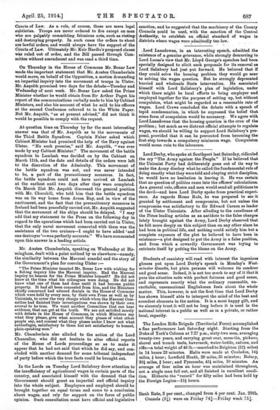At question time on Thursday by far the most interesting
answer was that of Mr. Asquith as to the movements of the Third Battle Squadron. Captain Faber asked which Cabinet Minister had promised the help of the Navy against Ulster. "No such promise," said Mr. Asquith, "was ever made by any Cabinet Minister." The movement of the battle squadron to Lamlash was decided on by the Cabinet on March ilth, and the date and details of the orders were left to the discretion of the Admiralty. This movement of the battle squadron was not, and was never intended to be, a part of the precautionary measures. In fact, the battle squadron could not have arrived at Lamlash at the earliest until two days after they were completed. On March 21st Mr. Asquith discussed the general position with Mr. Churchill, who told him that the battle squadron was on its way home from Arose Bay, and in view of the excitement, and the fact that the precautionary measures in Ireland had been peacefully carried out, Mr. Asquith suggested that the movement of the ships should be delayed. "I may add that my statement to the Press on the following day in regard to the operations which had been carried out in Ulster, that the only naval movement connected with them was the assistance of the two cruisers—I ought to have added 'and one destroyer '—was perfectly accurate." We have commented upon this answer in a leading article.


























































 Previous page
Previous page